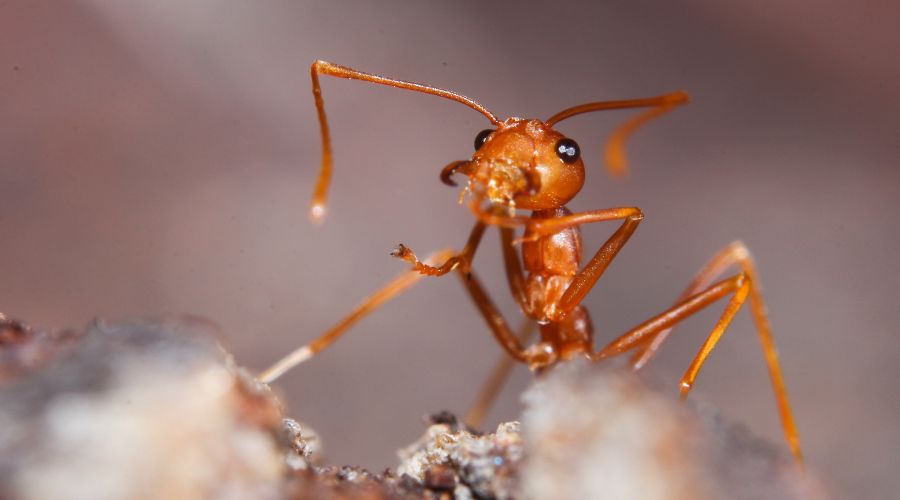For Dallas homeowners, nothing more infuriating than trying to win a never-ending battle against ants.
Think you’ve conquered one colony? Look again – there might be two more looming on the horizon.
Such a challenge becomes even more daunting when the opponent is the notorious fire ant. Today, let’s understand the dangers of fire ants in Dallas and what you can do about them.
What Are Fire Ants Attracted To?
Fire ants, much like other pests, are in a perpetual search for sustenance and hydration. Dallas’ warm temperatures and occasional dry spells only intensify their scavenging tendencies, making them more likely to venture into properties that quench their thirst and feed their appetite. What might invite these critters to set up shop in your backyard?
- Water Sources: Fire ants are partial to places with abundant water – think leaky pipes, improper drainage systems, or stagnant water puddles.
- Damp Areas: Buildings that harbor moist regions can become a haven for these ants.
- Food Galore: Be it plants, insects, meats, sugary delights, oils, pet food, or fruits, these ants aren’t fussy.
- Trash: An unsealed garbage bin is practically an open buffet invitation.
- Electrical Equipment: They are attracted to electrical gear for reasons not entirely understood.
- Compost & Mulch: These provide food and an ideal environment for nesting.
While numerous ways exist to repel these ants, they’re nothing if not persistent. If fire ants persist in causing a nuisance, always trust the expertise of pest control professionals, like those at Romney Pest Control, to handle the situation.
Are All Red Ants Considered Fire Ants?
No, not every red ant you spot is a fire ant. Texas is home to various native red ants, such as the red harvester, big-headed ant, and the raspberry-crazy ant.
While the latter two are primarily irritants, the red harvester ant can deliver quite a bite and a painful sting. However, distinguishing them is relatively simple. Red harvesters are considerably larger, ranging from 1/4 to 1/2 inches, while most other red ants are about 1/16 to 1/4 inches.
Over time, imported fire ants have encroached upon the territories of native ant species in Dallas. Recognizing them promptly is becoming increasingly crucial, given their growing regional dominance.
Dangers of Fire Ants: Why Are These Ants Such A Big Problem?
For anyone who has unwittingly stumbled upon a fire ant nest, the experience is hard to forget. Fire ants are known for their ferocity, not their bite, but their painful sting. Wander too close to their territory, and they will launch an aggressive onslaught, stinging any exposed skin.
These stings leave behind agonizing welts that persistently itch and sting for days. And while the pain might be tolerable for many, for others, a single sting can trigger alarming allergic reactions characterized by swelling, rashes, and even muscle aches.
Beyond their fierce defense mechanism, fire ants deploy an ingenious strategy for survival – budding. If threatened, they can divide their colony, multiplying the problem rather than solving it. So, think twice if you’re contemplating tackling them on your own.
How Do I Get Rid of Fire Ants?
Fire ants can be a formidable adversary, but with the right partner, you can overcome them. Romney Pest Control, a trusted local business, promises swift action and long-lasting solutions.
With a team of highly trained professionals, we employ state-of-the-art techniques and products tailored to Dallas properties, ensuring that fire ants are a problem of the past.
Discover why your neighbors choose Romney Pest Control for their pest control needs. Give us a call today!
Tips in Preventing Fire Ants in Dallas
To keep fire ants at bay, it’s essential to be proactive. Partner with Romney Pest Control and follow these preventative measures:
- Seal Potential Entrances: Regularly inspect your home’s exterior and seal any visible gaps.
- Secure Trash and Compost: Ensure outdoor trash cans and compost bins have tight-fitting lids.
- Maintain Outdoor Spaces: Keep outdoor eating areas spick and span, ensuring no leftover food debris attracts these pests.
- Lawn Care: Overwatering can be an invitation to fire ants. Maintain a proper watering schedule.
- Clear Debris: Remove any fallen trees or stumps from your yard, as they can provide nesting spots.
At the first sign of fire ants on your property, contact Romney Pest Control.




